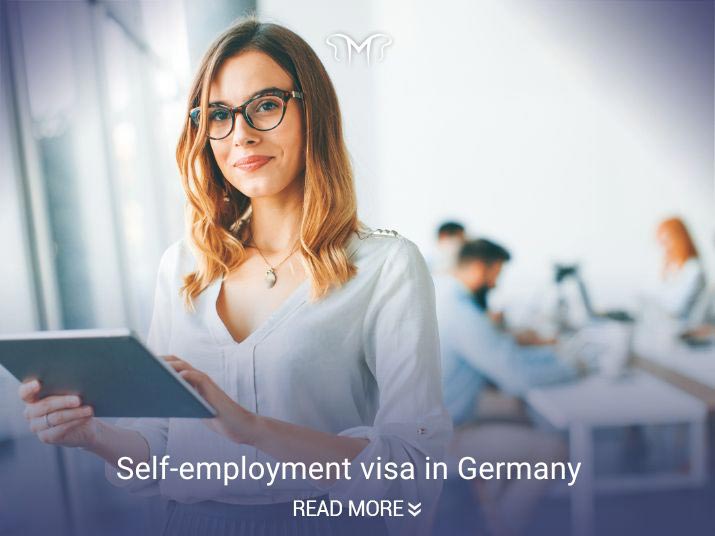
Navigating the Self-Employment Visa Maze in Germany!
Germany is recognized as the largest economy in Europe, offering a highly attractive environment for individuals who are engaged in self-employment and starting their own businesses. The country experiences rapid growth in small and newly established businesses, with most German businesses being small to medium-sized yet successful enterprises. Fortunately, Germany is a country where non-European residents with skills and entrepreneurial mindset can have unlimited self-employment opportunities and engage in freelancing or start a business. In this article, we intend to discuss the self-employment visa in Germany and the conditions for self-employment, providing you with any necessary guidance in this regard. Stay tuned with Monarch.
Types of Self-Employment in Germany
Only those who have a self-employment visa in Germany can start a business there. Individuals can apply for a self-employment visa through three methods, which we will explain below.
The first method to obtain a self-employment visa in Germany is to have expertise in a profession, whether working independently or self-employed. The second method is to start your own business as a trader or investor. The third method is to launch a business and engage in a specific field. Before applying for a self-employment visa in Germany, you must first determine which of these methods is more suitable for your business or which one you intend to start in Germany. It is important to note that meeting the necessary conditions for obtaining a self-employment visa in Germany, including providing educational documents, work experience records, and previous activities in the specialized field, is crucial.
What does freelancing mean in Germany?
Freelancing in Germany means working independently in various liberal professions or freelance occupations. After obtaining a self-employment visa in Germany, individuals can engage in freelancing in specific fields. Those eligible to work as freelancers in Germany include:
- Lawyers, tax consultants, accountants, engineers, and architects
- Doctors, dentists, veterinarians, surgeons, psychologists, psychiatrists
- Journalists, translators, writers, and teachers
- Artists, designers, musicians, photographers, actors
If a person's occupation or profession does not fall into these categories, they are considered a trader according to German laws. In such cases, after obtaining a self-employment visa and entering the country, they must register their business or occupation and pay the corresponding taxes. Ultimately, the German tax authorities decide whether your occupation is recognized as freelancing or classified as a business.

Difference between freelancing and self-employment
Some individuals in Germany might confuse self-employment with freelancing in Germany, as there is a subtle difference between the two. However, a freelancer must be careful to ensure that their intended activity does not fall under the category of self-employment. Otherwise, they may encounter difficulties in obtaining a self-employment visa in Germany. It is important to note that neither freelancers nor self-employed individuals fall into the category of employee positions. In both cases, you are the decision-maker regarding the services you provide, even though these two activities are very similar, there are still differences between them.
The main difference between the two lies in the fact that freelancers, or freelancers, operate under their own name in their business, whereas in self-employment, individuals operate under their own business name. From a legal perspective, it should be mentioned that freelancers do not need to register their business with the German Trade Office. However, individuals engaged in self-employment cannot start their activities without registering their business with the German Trade Office. Additionally, freelancers generally pay less tax compared to self-employed individuals.
Conditions for setting up a personal and self-employed business in Germany
Individuals who are citizens of the European Union do not need to obtain a self-employment visa in Germany to start their own business and can easily begin their ventures. However, individuals who are not EU citizens must obtain a self-employment visa in Germany. To obtain a self-employment visa in Germany, you must have a very strong business plan that is executable and not already provided by EU citizens and German nationals. In fact, you must prove that your plan is expected to have a significant and positive impact on the German economy.
Just presenting a business plan alone may not help you obtain a self-employment visa in Germany; you must also provide specific documents requested by the local foreign nationals office. After submitting these documents, the local chamber of commerce or other organizations will review your documents to determine if your business is economically viable and specialized enough for Germany. If your occupation is approved, a self-employment visa will be issued to you in Germany. However, it may be determined that you can only operate your business in a specific geographical area in Germany, with certain limitations imposed.

Self-Employment Visa in Germany
As mentioned earlier, to obtain a self-employment visa in Germany, you must either have skills and expertise in one of the freelancer or self-employed groups, or have a business idea that is both executable and profitable for the German economy. It usually takes three months for a self-employment visa to be issued in Germany. During the validity of your visa, you must go to Germany and convert your visa into a residence permit. If you can provide documents proving that your business is profitable for Germany and demonstrate financial capability for self-employment, your self-employment visa in Germany will be extended for up to three years. After three years, you can also obtain a permanent residence visa using your temporary permit. However, a permanent self-employment visa in Germany will only be issued if you decide to start a startup or company in this country.
Requirements before starting self-employment in Germany
Like any other immigration method, before receiving a self-employed visa in Germany, you must meet the following requirements and conditions:
• The first is the German language. Of course, learning the language is not mandatory to get a self-employment visa in Germany, but it is one of the requirements before starting employment in this country and it has many benefits.
• The second issue is age, of course, age is not a determining factor for starting employment and receiving a self-employment visa in Germany, but if you are over 45 years old, you must provide valid documents regarding funding for your retirement.
Read more: Age Limits in German Apprenticeships
• The third item is employment and education records, which are among the most important conditions and requirements for receiving a self-employed visa in Germany. If you are going to start a new job in Germany because of your expertise, you need to provide the most valid documents to prove your competence. In addition, there must be a logical connection between the job records and the educational records you provide. In fact, your educational records should show your sufficient professional qualification for self-employment and obtaining a self-employment visa in Germany.
Documents required to obtain a self-employed visa in Germany
To apply for a work visa in Germany, you must first submit the required documents to the German embassy or consulate in the country where you reside. It is usually recommended to apply for a work visa in Germany three months before your planned migration date, as the issuance of a work visa in Germany takes approximately three months if there are no issues. The documents required for applying for a work visa in Germany include:
• Valid passport
• 2 passport-sized photos (4x3 cm)
• Financial proof
• Business plan
• Completed visa application form
• Certificate of payment for the Euro process, which is around 100 euros
• Health insurance certificate
• Current job contract
• Resume detailing professional experiences and educational background to facilitate obtaining a work visa in Germany
• Two or more commitment letters from clients or employers in Germany for freelancers
Presenting a business plan for self-employment in Germany
To obtain a work visa in Germany, you need a business plan for the experts at the German embassy to review and understand your objectives. In this plan, the experts will determine whether:
• Your professional self-employment requirements align with the logic and reality of the German market
• Your self-employment will have a positive impact on the economy of the country
• You can achieve financial independence based on your job and support yourself and your family financially
In essence, the business plan for a work visa in Germany illustrates the opportunities and threats related to your business in the country. In other words, the business plan serves as a roadmap that can depict all the necessary steps in the initial stages of obtaining a work visa in Germany and starting a business in the country, providing the required details for your journey. You can use this plan both before and after launching your business to understand if you can achieve your goals in Germany or not. It also helps you identify what changes you need to make to your plan to implement your goals successfully.

How to start your work after entering Germany?
After obtaining your work visa in Germany, you have only three months to enter the country and start your work. To begin working in this country, you need to go through four main stages, which we will explain to you in this section:
Stage 1: Registering the address of residence after obtaining a work visa in Germany
The first thing you need to do after obtaining a work visa in Germany and entering the country is to specify your residential address. You don't need to invest in real estate for this. There is also no restriction on the minimum cost for determining your place of residence.
Stage 2: Opening a bank account
After obtaining your work visa in Germany and to start your work, you need a valid bank account. Since you also need to pay income taxes, it is better to have two bank accounts for controlling your account as a self-employed person.
Stage 3: Registering with the tax office
Another task you need to do after obtaining your work visa in Germany and entering the country is to register your business with the tax office. If you are starting work as a trader, you must register your job in the local trade office. However, if you are working as a freelancer with a self-employment visa in Germany, you need to register with your local tax office.
Purchasing Health Insurance
All individuals living in Germany must ensure themselves by having health insurance, as there are two types of health insurance in this country: public and private. Freelancers and self-employed individuals, especially if they are young and healthy, can opt for private insurance after obtaining their self-employment visa in Germany and entering the country, as it has lower costs compared to public insurance. For public insurance, individuals are required to pay approximately 14 to 15 percent of their monthly income for insurance coverage.
Self-Employment Tax Laws in Germany
After obtaining a self-employment visa in Germany and entering the country, freelancers and self-employed individuals, like other employees, are required to pay taxes. The tax rate in this country is progressive and depends on the income level of the individual. In 2022, the income ceiling for tax exemption was 9,984 euros. This means that if you earn more than this amount, you must pay 14% of your income as taxes. As the income increases, the tax liability also increases, potentially reaching up to 45%.

If your annual income exceeds 22,000 euros or is expected to reach 50,000 euros according to projections, you not only have to pay income taxes but also the value-added tax. Additionally, if you are a trader and earn more than 24,500 euros per year, you are obligated to pay business profit taxes. As a self-employed individual in Germany, after obtaining a self-employment visa and starting work, you must pay your taxes every three months. If you work as a freelancer, you need to provide a tax declaration after obtaining a self-employment visa in Germany and entering the country, allowing the German government to accurately calculate your taxes.


